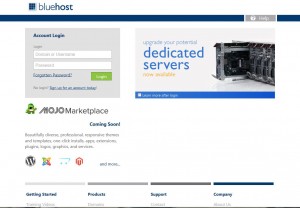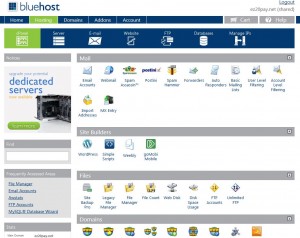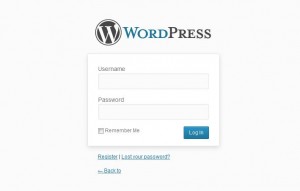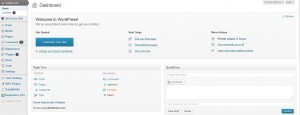 I’ve been talking about keyword research and how important it is for quite a while now in some of my previous posts. Keyword research goes hand in hand with SEO, and without proper preparation of your site, your efforts could (and will) be wasted. If you make a website blindly with no knowledge of what keywords you want to target, you WILL NOT succeed. I know that seems harsh, but it’s the cold hard truth.
I’ve been talking about keyword research and how important it is for quite a while now in some of my previous posts. Keyword research goes hand in hand with SEO, and without proper preparation of your site, your efforts could (and will) be wasted. If you make a website blindly with no knowledge of what keywords you want to target, you WILL NOT succeed. I know that seems harsh, but it’s the cold hard truth.
I want you to know exactly how important it is, and why you shouldn’t skimp on the very tedious but most important task : keyword research. I’m going to start from the beginning and take you all the way to the end…and I’ll actually show you how to do keyword research. I’ll show you the exact method I use (and I do all of my keyword research for free), and hopefully by the end of this post you’ll have a better understanding of the how’s and why’s.
Why is Keyword Research Important?
Researching your keywords before you start building a website or writing any content for it is crucial because it’s foundation of your business. A traditional business owner wouldn’t open a store without first doing market research, and knowing what the competition is in the area, or having a concrete plan of forward action…so neither should an online business owner. You must first start with an idea, and from there branch out and research that idea to make sure it’s profitable and doable. It’s the first step in any type of business plan.
Let me put it in simple terms. Every website is built around an idea. It will start off as a general idea (we’ll use the idea of popsicles for the rest of this post for explanation purposes) and then as you dig deeper into it, the idea evolves more and more in depth.
- You decide you want a website about popsicles
- You will add pages to your website about specific types of popsicles
Your niche is the “food” niche, but your micro-niche is popsicles. We’re not going to get any more specific on the niche selection process, since this is about keyword research, but it is important to understand that picking the right niche for your website is just as important as keyword research. The two kind of go hand in hand. You want to make sure your website topic is something that people are looking for and will find interesting. There must be a demand for what you’re website is about, other wise all the keyword research in the world will mean nothing, because there will be no keywords because nobody is searching for them.
Example 1 without doing keyword research:
So you have a website about popsicles and you’re ready to start populating the site with content. You begin writing without doing any keyword research. You write great articles, and you update your website daily. And you keep waiting for search engines to see your site and start sending you traffic. And you wait. And wait. You have no idea how many people are actually looking for the term you’re writing about, and no idea how much competition you have. You really don’t know what to expect, and you really have no plan. You may never receive traffic to your website because you have not chosen specific keywords you want to target for each page. It’s like playing the lottery. You may get lucky, but chances are…you won’t.
Example 2 WITH doing keyword research:
The same website, getting ready to start populating your site with content. You know that the term “popsicle recipes” gets searched 2900 in a month and that the competition for that term is not very high. You can easily rank for it, and there is traffic to support the work of writing the article. So you write the article. You do the same thing the next day before you write your next article. You find a keyword that will generate you traffic, and you target it. You do this daily, populating your website with high quality keyword targeted articles. And then you wait. And then you get traffic. But you already knew you were going to because you did your research on the market.
Keyword research is important because it sets you up for success.
How to Do Keyword Research
Alright, so now you know why you have to do the research, the next step is know how. There are a lot of different ways you can do it. There is no right or wrong way. You can choose to use paid tools, or free tools. Which ever way you choose is completely up to you. Once you’ve been doing it for a while, it’s going to seem like second nature to you and you’ll most likely find different ways that work to get your information. This specific method I’m going to talk about is exactly what I do. I don’t use paid tools (you may want to as you start making money – they are helpful in a lot of ways), and I’ve found that doing it this way is all I need. I do all my keyword research using Google and the free keyword tool they offer.
The first step is to go to the Google free keyword tool. The URL of this is always changing, so it won’t help to bookmark it. Just go to Google and type in “keyword Tool”. It will pop up in the search results. Click it and then you will be taken directly to it.
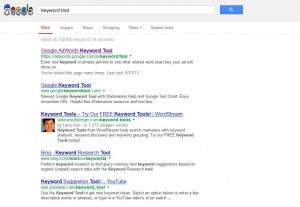
If you have an Adwords account, it’s helpful to sign in. You get to see more information. If you don’t, not a big deal. The next step is to type in the keyword phrase or idea you have in the “Word or Phrase” box. You can enter more than one, but make sure you only put one phrase per line. In this case, we’ll type in “popsicle”. Don’t worry about anything else, (except the captcha of course) and just click search.
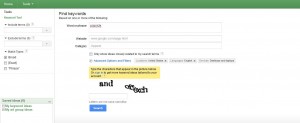
Once you click search, it will then populate the bottom of the screen with a bunch of related keywords. You notice exact phrases you typed in will be on the top. There will be 4 different columns – keyword, competition, global searches and local searches.
Keyword – The actual keyword you’re researching.
Competition – The number of people competing for that keyword in Adwords. It is very important to understand that this is NOT YOUR competition. It’s the number of people paying for advertising for that keyword. You can just ignore it.
Global Searches – The number of times the keyword gets searched globally – worldwide.
Local Searches – The number of times the keyword gets searched within the location that is specified. It’s generally your location. My location is the United States. You can change this in the options before searching.
Understanding the Results
The next thing we want to do after performing the search, is narrow it down and find keywords that we can target. To do this, we want to know the exact number of exact searches that phrase gets. So we click the [Exact] box over to the left. We leave broad checked also, just so we can compare the two.
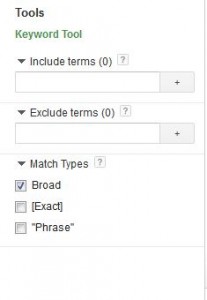
Once you check the [Exact] box, that will put [..] around all the keyword phrases. This will now give us an exact number of how many times that exact phrase is searched. Broad gives us a number of how many times the general phrase gets searched…there could be additional keywords in there or not in there. We want the exact phrase.
The next step is to scroll down the list of keywords and see if any of them look good to you. A good keyword is going to have at least 10 local searches a day (about 300 monthly). Obviously it’s up to you and what you think will be worth it. You may find keywords that get thousands of searches a month, and you may find keywords that don’t get even 300 searches but they work well for your site and are exactly what you want. Generally though, to make an article worth it you’re going to want at least 300 searches a month. Take a look at [popsicle recipes]:

We have 4400 global searches and 2900 local searches. This looks like it could be a good keyword. In order to know for sure though, we now need to check the competition. To do that, we go directly to the Google search engine. I open another browser window so I can switch back and forth between the two.
I first type in the phrase popsicle recipes and see what comes up. There are about 4,590,000 website that are competing for this broad phrase. You can see that number right under the search bar.
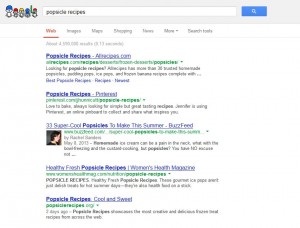
The next step I want to see is how many websites are competing for this phrase exactly (remember, that phrase exactly must be somewhere within the webpage.) I search for exact by putting the phrase in quotes like this “popsicle recipes”. The result I get for exact is 148,000 websites competing. This is a much better number, but still not good. But also…still not what we’re after. Now you’ll notice that the results all have the exact phrase “popsicle recipes” in bold.
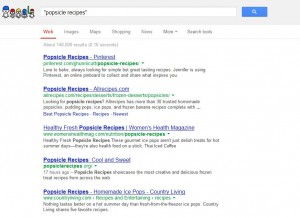
The last step is checking the allintitle number of results. Type this into the search bar : allintitle:”popsicle recipes”. Google will now return the results that have the exact phrase in the exact order in the title of the page. This is the number we care about for competition. The result is 3,170 websites competing for that phrase. Someone with good SEO knowledge and good content can easily rank for this term. A general rule of thumb when looking for how much competition there is, try to keep it below 40-50,000 results. Obviously the less competition there is, the easier to rank for. 50,000 competing is certainly doable if you are diligent with your backlinking and website promotion.
Another step you may want to take in keyword research is checking out the actual competition. Go to there webpages, see what they’re doing to rank well, and also make sure it’s a site that you can out rank. For example…it’s going to be kind of hard to outrank high authority sites like CNN News or others.
Keyword research is the bread and butter of your online business. Now you know how to do it, and you can do it for free. Do not make light of this step of the process. The more research you do, the more chances of success you will have. Don’t waste your time without it. A man without a plan…plans to fail. Remember that, it’ll be worth it in the end.
Make sure to check out my post about using blogging and content sites to make money.
Did you find this post useful or informative? Can I add to it or change it in anyway to make it better? Or how ’bout better yet…do you have any keyword research tips to add? Let me know – leave a comment! Also, if you liked this post, please share it with the buttons so others can enjoy it as well!










